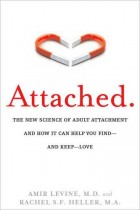Tarcher, $24.95, 304 pages
Psychologist Amir Levine and Pyschoanalyst Rachel Heller have compiled case studies, questionnaires, research papers, and quick tips for adults looking to understand love from a new perspective. The perspective is from Attachment Theory which was developed as a result of the experiences of child care professionals during World War II in caring for the many thousands of small children temporarily separated from their parents or orphaned. Essentially, children attach to caregivers instinctively for the purpose of survival, when that attachment is interrupted or never established, the children fail to thrive. The different attachment patterns that are derived from the caregiver relationship are 1) secure 2) avoidant, and 3) anxious. When these children grow to adulthood, their ability to find and keep relationships depends on their ability to attach, learned in infanthood.
While the novel attempts to validate the different styles of attachment that have formed from different upbringings, it is clear that only one style is termed “normal” while the other two are damaged in some way. Exercises aim to improve relationships for the damaged attachment styles so that individuals may find the secure attachment that they should have received in infanthood with their life partners. Levine and Heller have certainly done their homework as the list of studies peppered throughout the book is extensive. This is perhaps the first book that focuses on the attachment needs of adults instead of children. An easy read, though bleak at times (there is even a section about how to conduct oneself during a break-up). While the take home message is a good one “Some people are just wrong for you and you can’t change them,” the analysis of the attachment system was too black and white. Adults rarely fit or stay in one category.
Reviewed by Rachelle Barrett

